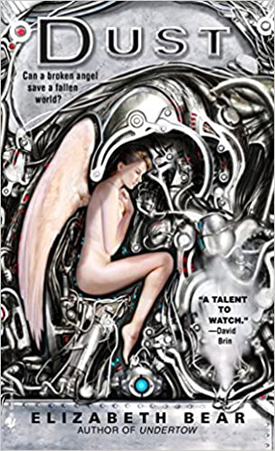 At her best, Elizabeth Bear can deliver the kind of hard-edged poetry that one often searches for in vain in science-fiction. (She also does some hard-nosed fantasy, but that’s for another review.) It may seem strange to talk about “poetry” and “science fiction” in the same sentence, but one need only read Dust to see exactly what I mean.
At her best, Elizabeth Bear can deliver the kind of hard-edged poetry that one often searches for in vain in science-fiction. (She also does some hard-nosed fantasy, but that’s for another review.) It may seem strange to talk about “poetry” and “science fiction” in the same sentence, but one need only read Dust to see exactly what I mean.
Rien is a Mean in the service of Rule. She is assigned to care for the Exalt prisoner Perceval, taken by Ariane Conn by dishonorable means (Ariane cut off Perceval’s wings after Perceval had surrendered), who is to be executed and consumed the next day. Rien is fascinated by the prisoner, and finds herself growing fond of her. She is shocked to learn that they are sisters, Rien given over as a hostage and, as seems to be more and more evident, Perceval set up as a pretext for war between Rule and Engines for control of the world. Rien helps Perceval escape, and they journey across the world – a massive generation ship – in search of their father, Benedick Conn, as the unstable double star the world circles edges closer and closer to annihilation.
There are other players, of course, most notably the angels Jacob Dust, Samael, and Asrafil, remnants of God, which is to say fragments of the ruling AI from the time of movement, who realize that they must act to save the world, and that acting means consuming each other to reconstitute God – insofar as they are able – and so each takes a champion: Dust kidnaps Perceval, Samael befriends Rien, and Asrafil supports Ariane. There is the necromancer Mallory, who aids Perceval and Rien in their journey, and gives Rien the memories of Hero Ng, once Chief Engineer, in a peach. There are Rien’s relatives, Caitlin, Benedick, and Tristen Conn, who have their own histories and their own agendas. And there is the ship itself, a maze of living and dead corridors and spaces, domaines, holdes, heavens and hells. And there are the symbionts, perhaps the most important, bio-engineered nanotechnology that produces supermen, as Rien discovers when she becomes Exalt.
A number of writers have attempted to incorporate and/or extrapolate our newest technologies – nano, bio, cyber, what-have-you – into science fiction stories, with varying degrees of success, and when they begin to reach as far into the future as Bear does here, their efforts seem more and more tenuous. (And then again, the near future isn’t necessarily safe territory: Vernor Vinge’s Rainbow’s End, which won the Hugo, incorporates computers into clothing. Someone, and I forget who, recently announced the prototype of a computer in eyeglasses. There are now video screens that can be rolled up for storage or transport.) Bear has done it, has taken the leading edge of our technology and pushed it centuries ahead, and she’s done it beautifully, making not only a real science fiction story that relies on the technology to make it work, but making it believable. She brings that quality of wonder back into the field in the service of a rousing – though admittedly not particularly fast-paced – adventure story.
About the poetry: that is, perhaps, the most striking feature of this book, just the sheer richness of invention that seeps into every sentence, that whole quality of ellipsis that is, after all, what sets poetry apart from prose. We learn about this ship/world not by exposition but by inference (which I happen to think is the way that’s the most fun, and if it’s not going to be fun, why am I reading it?), and the references to Judaeo-Christian mythology are handled the same way. This adds another layer to what is, in retrospect, a fairly dense story.
And so, as she seems to do consistently with The Promethean Age novels, Bear has given us a story with those flashes of recognition one gets from poetry, that sudden illumination unlooked for but welcome, that makes Dust much more than just another science-fiction story.
(Bantam Spectra, 2007)
